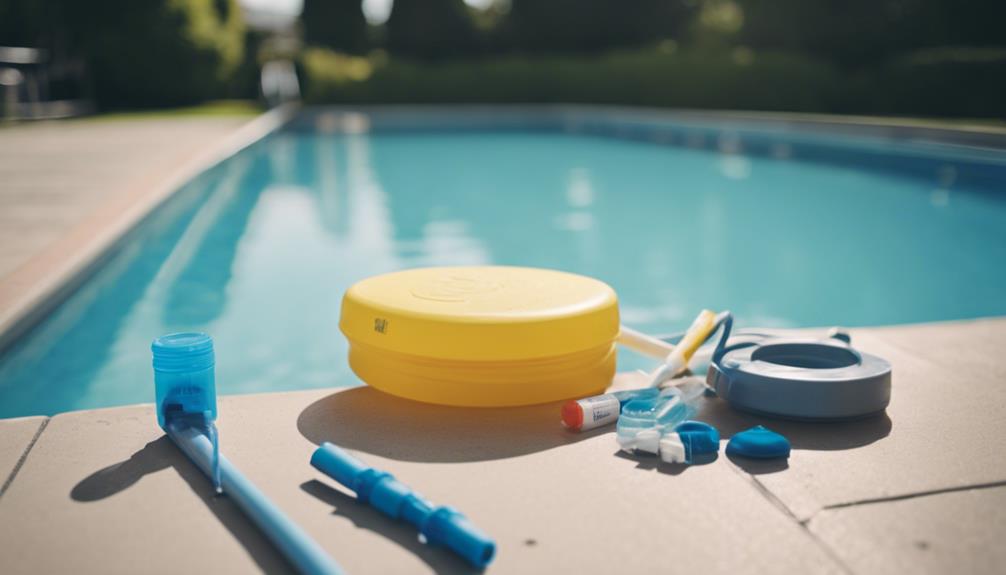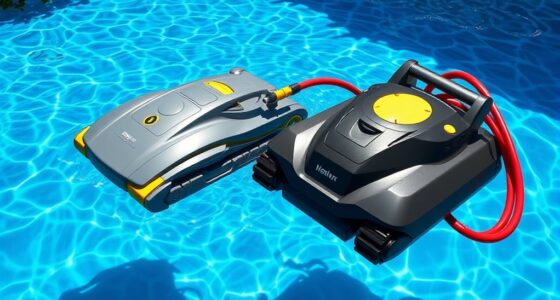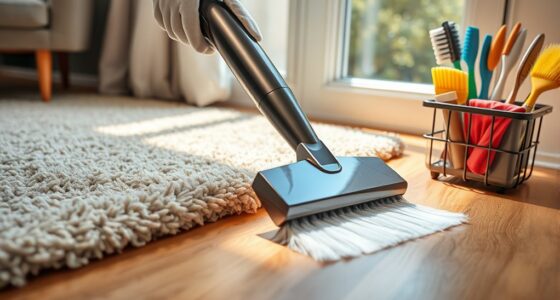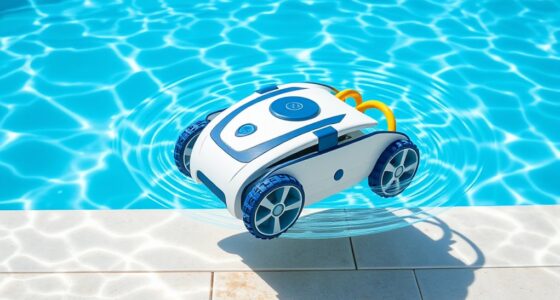To ensure a clean and safe pool in the United Kingdom, it is important to follow a consistent maintenance schedule. Regularly skim and vacuum the pool to keep it clean, monitor pH and chlorine levels, and adjust as necessary. Follow manufacturer guidelines to clean the filtration system properly. Prevent algae growth by ensuring proper circulation and regularly scrubbing the pool. During winter, lower water levels and use winterizing chemicals. Store pool chemicals safely and follow label instructions. Prioritize safety by wearing protective gear and avoiding chemical mixing. By implementing these essential tips, you can maintain top-notch pool care in the UK. Additionally, maintaining clean swimming pool water also involves regularly testing for bacteria and contaminants. Weekly shocking of the pool is important to kill any bacteria present. Regularly cleaning and scrubbing the pool walls and floor is crucial to prevent buildup and discoloration. By consistently following these practices, you can ensure a safe and enjoyable swimming experience for everyone.
Key Takeaways
- Use winterizing chemicals to balance water before the cold season.
- Cover the pool to prevent debris accumulation and maintain water quality.
- Invest in a pool cover pump to prevent water buildup on the cover.
- Regularly check and maintain pool equipment to ensure proper functioning.
- Consider professional pool closing services for thorough winter preparation.
Pool Cleaning and Skimming
Regularly skim your pool surface to keep it free from leaves, insects, and debris for cleaner water. Investing in a quality skimmer or net will help efficiently remove floating particles, ensuring your pool remains clean and inviting.
By skimming your pool daily, you can prevent debris buildup and maintain a clear water surface that's inviting for a revitalizing swim. Additionally, vacuuming your pool weekly is essential to eliminate dirt and fine particles from the pool floor, further enhancing the cleanliness of your pool water.
Consistent skimming and vacuuming are essential to prevent the accumulation of debris, ensuring excellent pool cleanliness throughout the year. Make it a habit to take care of your pool by regularly skimming the surface and using a vacuum to remove any dirt, leaves, or debris that may compromise the quality of your pool water.
Water Chemistry Balancing

To guarantee your pool remains clean and safe for swimming, it's important to maintain proper water chemistry balancing. This involves monitoring and adjusting key factors such as pH levels, chlorine levels, and alkalinity levels.
Keeping the pH levels between 7.0 and 7.6 is essential as it maintains water balance and prevents damage to pool finishes. Regularly testing the water for chlorine levels, ideally 2-3 times a week, is necessary to keep the water clean and safe for swimmers.
Additionally, maintaining alkalinity levels between 80 and 120 ppm is crucial for effective water sanitization. Utilize reliable water testing kits to accurately measure the chemical balance in your pool water.
Chlorine Level Monitoring
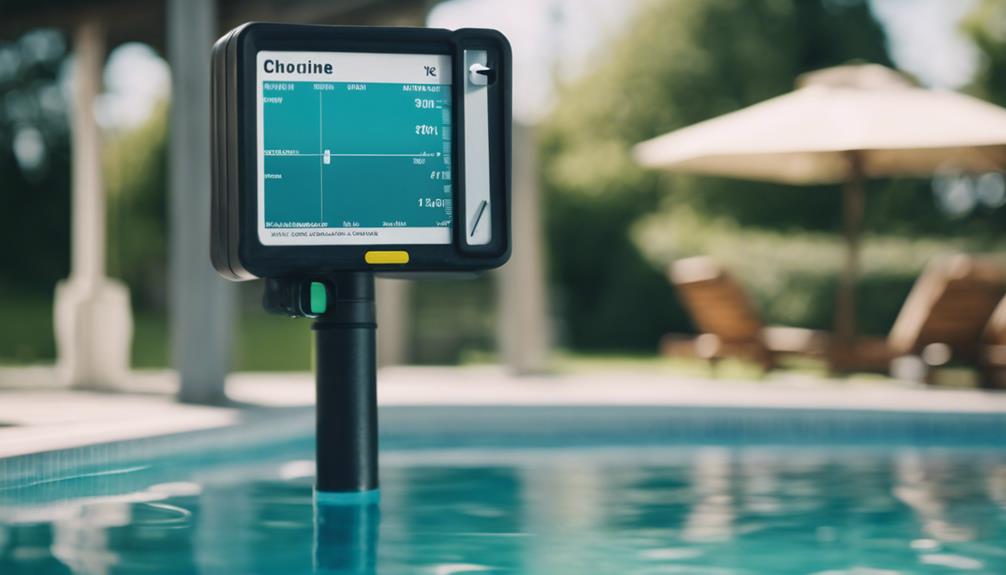
To maintain a healthy swimming environment, it's essential that you regularly monitor the chlorine levels in your pool.
The recommended chlorine level for pools in the UK ranges between 1.0 and 3.0 parts per million (ppm).
Use test kits to check these levels and make adjustments as needed to guarantee proper sanitization and prevent the growth of harmful bacteria and algae.
Proper Chlorine Testing
Maintain your pool water's proper sanitation by testing chlorine levels at least 2-3 times a week.
The ideal chlorine level for pools in the UK falls within the range of 1.0 to 3.0 parts per million (ppm).
To accurately measure chlorine levels, make sure to use a reliable pool water testing kit.
Regular testing allows you to adjust chlorine levels as needed, ensuring a safe and clean swimming environment for you and your family.
If you find that chlorine levels are low or contaminants are present, it's essential to shock the pool.
Shocking the pool helps to boost chlorine levels and eliminate any harmful contaminants that may have accumulated.
Balancing Chlorine Levels
Consistently monitoring your pool's chlorine levels is essential for maintaining a healthy and safe swimming environment. Keeping the chlorine levels within the ideal range of 1.0 to 3.0 parts per million (ppm) is vital to uphold proper sanitization and prevent bacteria growth in your swimming pool water. Regularly testing the chlorine levels using a pool water testing kit is a simple yet effective way to uphold this balance. Adjusting the chlorine levels based on the test results is necessary to keep the water clean and safe for swimmers. By maintaining the proper chlorine levels, you can also prevent algae formation and uphold crystal-clear water quality in your pool. Check out the table below for a quick reference on balancing chlorine levels:
| Chlorine Levels | Actions |
|---|---|
| Below 1.0 ppm | Add chlorine to increase |
| 1.0 – 3.0 ppm | Maintain within this range |
| Above 3.0 ppm | Dilute water or wait |
Filtration System Maintenance
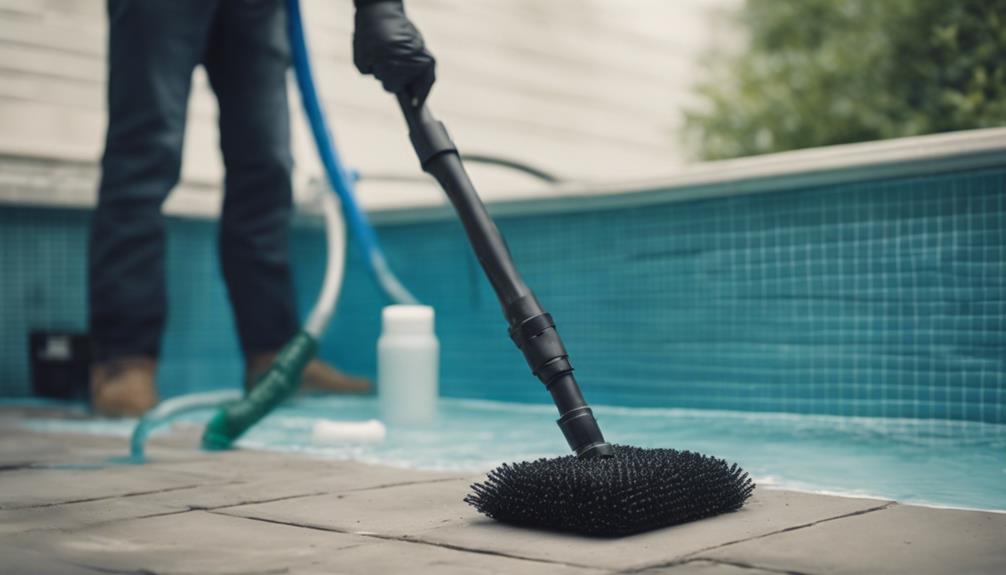
You must adhere to a strict schedule for cleaning or backwashing your filtration system to maintain its efficiency and clarity.
Regularly inspect and clean the skimmer and pump baskets to prevent blockages and guarantee proper water flow.
Filter Cleaning Frequency
Regularly cleaning or backwashing your pool filter every 2-4 weeks is essential for maintaining peak filtration efficiency. Following the manufacturer's guidelines on filter cleaning frequency is vital to guarantee your filtration system works at its best.
By removing trapped debris during these cleanings, you help prevent clogs and ensure water flows through the filter without restrictions. This maintenance routine not only keeps your pool water clean and clear but also contributes to the overall effectiveness of your system.
Remember to inspect and clean the skimmer and pump baskets alongside your filter maintenance to further enhance the efficiency of your pool system.
- Follow Manufacturer's Guidelines: Adhering to the recommended cleaning frequency ensures your filter operates effectively.
- Prevent Clogs: Regular cleaning helps remove debris, reducing the risk of clogs that can hinder filtration.
- Enhance Overall Efficiency: Cleaning the skimmer and pump baskets in conjunction with filter maintenance boosts the efficiency of your entire system.
Pump Inspection Schedule
To maintain peak performance of your filtration system, make sure to regularly inspect and clean the pool pump according to the manufacturer's guidelines. Pump inspection is essential for best filtration, as it helps in preventing pump clogs, ensuring efficient filtration, and promoting water circulation. By adhering to the recommended pump maintenance and cleaning frequency, you can enhance the equipment lifespan and maintain clear pool water.
During pump inspections, check the pump basket for any debris and promptly remove blockages to facilitate proper water flow. This proactive approach not only prevents potential clogs but also contributes to the overall health of your pool system. Efficient water filtration is directly linked to the condition of your pump, making regular inspections a fundamental aspect of pool maintenance.
Media Replacement Importance
Maintaining peak filtration system performance necessitates timely replacement of filter media to guarantee clear and clean pool water. Proper maintenance of filter media is essential for best filtration efficiency and water clarity.
Here are three key points to take into account regarding filter replacement in your pool filtration system:
- Filter Media Type: Different pool filtration systems require specific types of filter media such as sand, cartridge, or diatomaceous earth. Using the correct filter media is essential for maintaining water quality and maximizing filtration efficiency.
- Manufacturer's Recommendations: It's important to follow the manufacturer's guidelines for filter replacement frequency. Adhering to these recommendations ensures that your filtration system operates at its peak capacity, providing you with clean and clear pool water.
- Lifespan and Performance: Regularly replacing filter media not only improves water circulation but also extends the lifespan of your filtration system. By prioritizing filter maintenance, you're investing in the long-term functionality and effectiveness of your pool filtration setup.
Algae Prevention Techniques
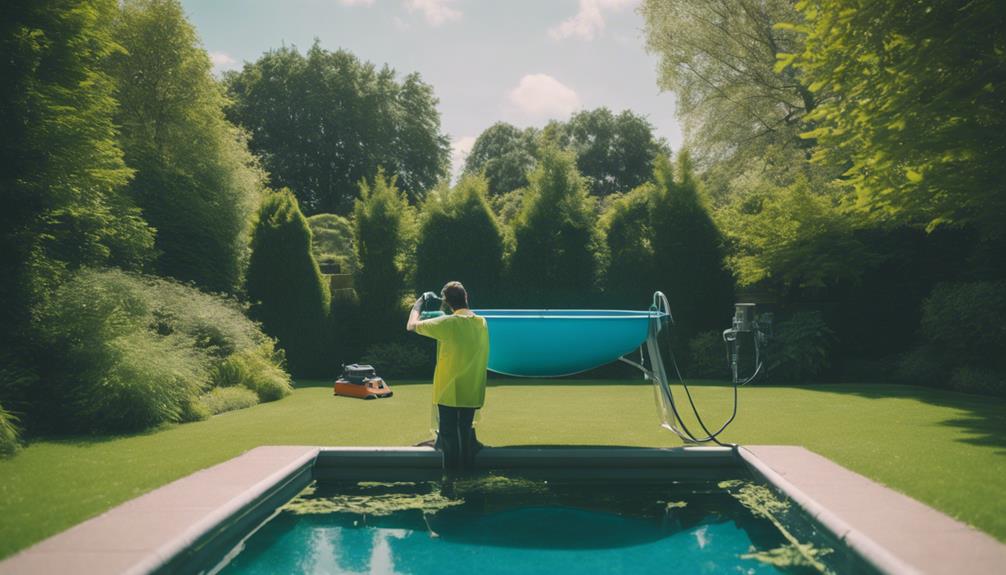
Proper circulation and filtration in your pool are essential for preventing algae growth. Algae, a common issue in UK pools due to the damp climate and sunlight exposure, can be effectively controlled by ensuring that your pool water is constantly circulating and being filtered. By maintaining proper circulation, organic matter that algae feed on is removed, thereby inhibiting algae growth.
Additionally, using algaecide treatments can be a valuable technique to control and prevent algae infestations. Regularly scrubbing the walls and floors of your pool is also vital in preventing algae buildup and maintaining a clean pool environment.
Moreover, monitoring and maintaining adequate chlorine levels in your pool water play a key role in algae prevention. By combining these techniques and staying diligent in your pool maintenance routine, you can effectively keep algae at bay and enjoy a crystal-clear pool all year round.
Winter Pool Care Tips

During the colder months in the UK, ensuring proper winter care for your pool is vital to prevent damage and maintain water quality. Follow these tips to keep your pool in top condition:
- Lower Water Level: Lower the water level in your pool to prevent freezing, which can lead to potential damage. By reducing the water level below the skimmer opening, you can safeguard your pool from ice formation.
- Winterizing Chemicals: Add winterizing chemicals to your pool to keep the water clean and balanced throughout the winter. These chemicals will help prevent algae growth and maintain water clarity during the colder months.
- Pool Equipment Protection: Protect your pool equipment by covering it properly and ensuring it's winterized to prevent damage from frost. This includes covering pumps, filters, and heaters to shield them from the harsh winter conditions.
Consider professional winterization services to ensure comprehensive care for your pool.
Regularly check your pool cover for any damage to maintain its effectiveness in protecting your pool during winter.
Proper winter care is essential for maintaining your pool's longevity and water quality in the UK.
Safety Measures With Chemicals
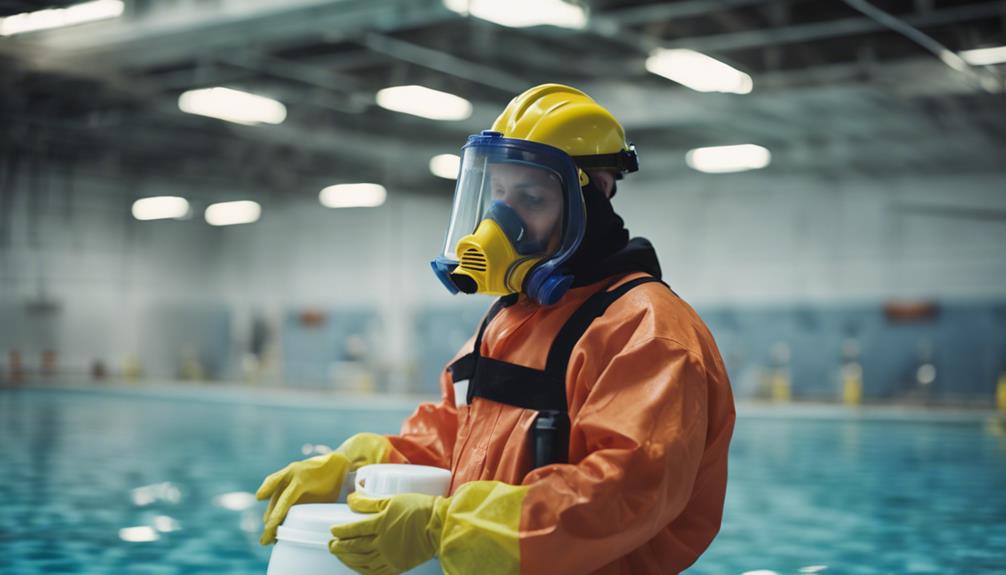
To guarantee safe handling and storage of pool chemicals, it's important to follow specific guidelines and precautions. When dealing with pool chemicals, always wear the necessary personal protective equipment, such as gloves and goggles, to protect yourself from potential harm.
Store these chemicals in a cool, dry area away from sunlight to maintain their effectiveness and prevent any unwanted reactions. Make sure to carefully read and follow the instructions on the chemical labels to avoid accidents or chemical mishaps.
Avoid mixing different pool chemicals together before adding them to the water, as this can lead to dangerous reactions. Additionally, never reuse containers that previously held pool chemicals for storing other substances to prevent contamination and potential hazards.
Frequently Asked Questions
How to Maintain a Pool in the Uk?
To maintain a pool in the UK, you need to focus on several key aspects:
Regular cleaning, water testing, and chemical balancing are essential tasks that ensure the water quality remains optimal.
Using pool covers is vital to prevent debris buildup and retain heat, especially in changing weather conditions.
Seasonal tasks such as winterizing and summer reopening play a crucial role in preparing the pool for different weather conditions.
Water replacement every 1-2 years helps control dissolved solids, maintaining water quality.
Properly maintaining the filtration system by cleaning or backwashing filters and checking pump baskets is necessary to keep the pool water clean and clear.
How Expensive Is It to Maintain a Pool Uk?
How costly is maintaining a pool in the UK?
Expenses can range from £500 to £1,500 annually, influenced by factors like pool size, materials, and upkeep needs. Costs encompass chemicals, energy for heating/filtration, and occasional repairs.
To reduce expenses, perform routine cleaning, water testing, and equipment maintenance. Opt for energy-efficient gear, covers, and automation systems to cut ongoing costs.
Professional maintenance services can add £60 to £100 per visit to your overall expenses.
How Often Do Swimming Pools Change the Water in the Uk?
Swimming pools in the UK typically change their water every 5 to 7 years to maintain water quality and clarity. The frequency of water changes varies based on usage, maintenance, and water quality. Regular testing and treatment can help extend the time between changes.
Proper filtration and chemical balance reduce the need for frequent changes. Consult a professional pool maintenance service for guidance on when to change your pool water.
What Can I Do With My Pool Water Uk?
To maintain your pool water in the UK, make sure to regularly test pH, chlorine levels, and alkalinity.
Utilize chlorine, bromine, or saltwater systems for effective sanitization.
Regularly clean and maintain your filtration system to keep water clear and debris-free.
Following these steps will help prevent algae growth, bacteria buildup, and skin irritation.
Adhering to UK guidelines for pool water treatment prolongs your pool's lifespan and enhances the overall swimming experience.
Can I Use Alternative Methods to Fill My Pool in the UK?
In the UK, finding filling your pool alternatives is crucial due to water conservation efforts. Consider using rainwater harvesting or purchasing a water meter for cost-effective usage. Utilizing greywater from showers and sinks is also an environmentally friendly option. Always research local laws and regulations before choosing a method.
Conclusion
To sum up, taking care of your pool in the UK is crucial to guarantee its longevity and enjoyment. By following these tips for cleaning, balancing water chemistry, monitoring chlorine levels, maintaining the filtration system, preventing algae growth, and practicing winter pool care, you can keep your pool in top condition.
Remember to always prioritize safety when handling pool chemicals. With proper maintenance, your pool will be a revitalizing oasis for you to relax and enjoy all summer long.

